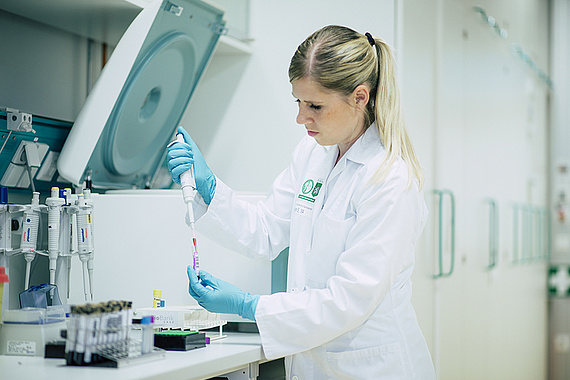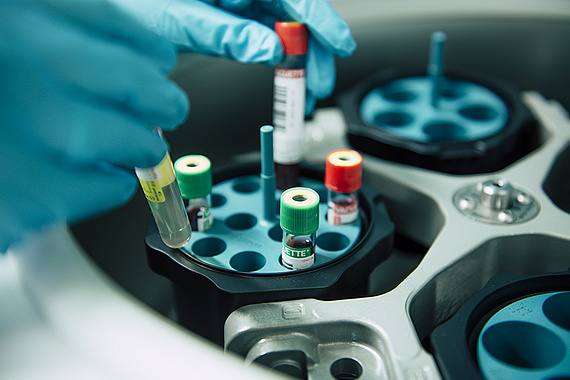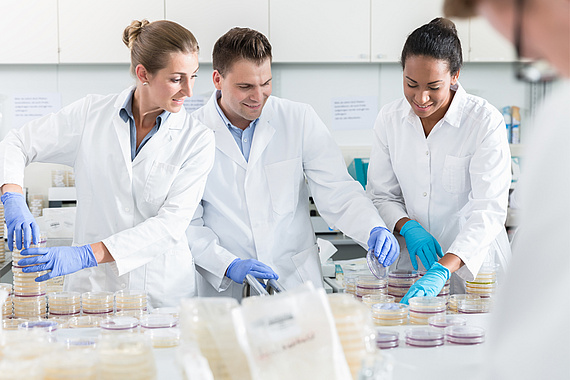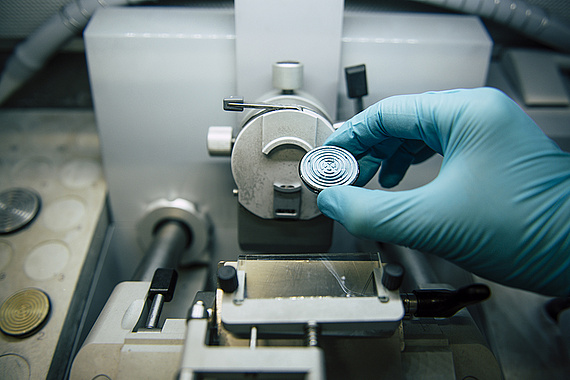- The University
- Studying
-
Research
- Profile
- Infrastructure
- Cooperations
- Services
-
Career
- Med Uni Graz as an Employer
- Educational Opportunities
- Work Environment
- Job openings
-
Diagnostics
- Patients
- Referring physicians
-
Health Topics
- Health Infrastructure
International Biobanking Education
One of the largest clinical biobanks in Europe is located at Med Uni Graz. The Biobank Graz stores about 20 million biological samples and corresponding data and provides them for research purposes. As we have gained many years of experience in the multidisciplinary field of biobanking, we offer different educational opportunities for international biobankers.
- Various biobanking courses:
- a biobanking course for those who are involved in setting up a new biobank (Basic-Course) and
- a biobanking course for those who are advancing the activities of established biobanks (Advanced Kurs)
- a course "Sustainability in Biobanking" (incl. Team Management and Project Management in Biobanking)
- A distance learning Master course “MSc CE Biobanking”
- Individual training possibilities as well as guided tours are offered upon request
For more information about the respective courses please see below.
Teaching Language:
The teaching language of all courses offered under the heading "International Biobanking Education" is English.

How to build a biobank (Basic)
This interactive course has been designed for all those who are involved in setting up a new biobank, who look to collaborate with a biobank or research institute, who face the challenges of a growing biobank or who try to overcome the challenges of maintaining a large biobank.
The format of this course is a mixture of presentations and discussion sessions allowing participants to learn from the expert advice and the specific experience of their peers. Bring your questions with you for discussion.
- Next date: 02.10.2025 - 03.10.2025
- Time:
- Day 1: 8.30 a.m. - 1.30 p.m. (CET)
- Day 2: 8.30 a.m. - 2.30 p.m. (CET)
- Cost: 300 Euro
- ONLINE via WEBEX
At a glance
- Language: English
- Teaching Method: 80 % lecture and 20 % discussion
- Location: ONLINE via Webex
This course is set up to
- Deliver the theoretical, operating and hands-on comprehensive knowledge essential to enable the activities of emerging and established biobanks.
- Transfer best practices for biobank personnel, investigators, clinicians and interested personnel.
- Encourage exchange of knowledge and skills across different biobanking activities from biospecimen preservation and storage to science and research.
- Enhance research quality in and public awareness of biobanks.
Insights
Key topics include:
- Definition, function, and challenges of biobanks
- Minimal requirements for biobank setup
- Quality management and regulatory standards (ISO, CEN)
- Ethical and legal considerations in biobanking
- Data management and IT infrastructure
- Sustainability strategies, cost calculation, and funding models
- Sample logistics, risk management, and biobanking networks

How to Operate a Biobank (Advanced)
This advanced course is designed for professionals who have already established a biobank and seek to enhance its operations. Through a combination of expert-led lectures, interactive discussions, and practical exercises, participants will gain insights into strategic biobank management, quality assurance, automation, data management, and sustainability planning.
- Next date: 13.10.2025 - 15.10.2025
- Time:
- Day 1 & 2: 09:00 – 17:00 CET
- Day 3: 09:00 – 17:30 CET
- Cost: 680 Euro (includes coffee breaks, lunch, and dinner)
- ONLINE via WEBEX
Overview
At a glance:
- Language: English
- Teaching Method: 70 % lecture and 30 % group work & discussions
- Location: Medical University of Graz, Austria
This course is set up to
- Deliver theoretical, operating and practical comprehensive knowledge to enable the activities of current and emerging biobanks
- Transfer best practice principles on this topic for biobank personnel, investigators, clinicians and interested personal
- Encourage exchange of knowledge and skills across on the topic via group works and discussions
The format of this course is a mixture of presentations and group works with discussion sessions allowing participants to learn from the expert advice and the specific experience of their peers. Therefore, bring questions with you for discussion!
International Biobanking and Education is also partner in different European projects. The idea for this course and the course development has been developed within the two EU-HORIZON 2020 projects CY-Biobank and ARICE.

Sustainability in Biobanks
This online course is designed for professionals working in biobanks and biobanking-associated research facilities. It provides theoretical knowledge and practical skills in leadership, team management, and scientific project management, specifically addressing the interdisciplinary challenges of sustainability in biobanks.
Course format: This course includes a mixture of lectures and discussion sessions.
- Next date: Spring 2026
- Time: 09:00 a.m. – 4:30 p.m. (CET) each day
- Cost: 450 Euro
- ONLINE via WEBEX
At a glance:
- Language: English
- Teaching method: 70 % lecture and 30 % discussions
- Location: ONLINE via Webex
This course is set up to
- Successfully form (lead) a multidisciplinary team in biobanks and biobanking-related scientific facilities
- Transfer knowledge and best practices on the individual topics, regarding both, general biobanking staff and personnel with scientific tasks
- Encourage the exchange of knowledge and skills on these topics through discussions, specifically addressing the individual needs of the participants
Insights
What You Will Learn – Key Topics
- Leadership & Project Management – Leading biobank projects, task delegation, and communication strategies
- Scientific Writing & Research Proposals – Literature research, citation rules, and PRISMA methodology
- Effective Communication & Teamwork – Internal/external communication and team-building exercises
- Biobank Operations & Resource Management – Staff and project cost calculations, management tools
Gain practical skills to lead, collaborate, and manage biobank projects effectively!

Individual Training & Support
Our team offers individual training and support in biobank development and biobanking. The expert know-how ranges from setting up/maintaining and expanding (international) biobanks to providing professional and educational support regarding
- (International) collaboration possibilities
- Management, quality management and communication
- Sample workflow and automation
- Business plan development
- Ethical and legal issues
- Technical requirements and IT
- Sustainability and budgeting
- Epidemology
- Strategic (development) approaches and research
If you are planning to set up, improve or expand a biobank or seek to aquire expert know-how in the fields mentioned above, don’t hesitate to contact us. We will elaborate an individual development support plan.

Master of Science CE Biobanking
The extensive international growth of biobanks requires the training of experts. The university course provides the knowledge required for the establishment, equipment, management and practical implementation of biobanks.
Projects
CY-Biobank
The CY-Biobank project will enable the concentration of a critical mass of experts at the CoE who will be thrilled to establishing collaborations and offering technology infrastructure and know-how to young investigators and medical doctors who are interested in pursuing innovative research projects. Center of Excellence biobank.cy aspires to serve as an incubator of creative ideas for research based on valid and sound scientific hypotheses. At the CoE you will find postdoctoral fellows and graduate students working side by side with UCY faculty, medical doctors and other experienced researchers, pursuing projects of translational medicine, always aimed at serving the patient.
More information: https://biobank.cy
TedXMeduniGraz
TED
TED is a nonprofit organization devoted to Ideas Worth Spreading. Started as a four-day conference in California 25 years ago, TED has grown to support those world-changing ideas with multiple initiatives. The annual TED Conference invites the world's leading thinkers and doers to speak for 18 minutes. Their talks are then made available, free, at TED.com.
TEDx (x = independently organized event)
In the spirit of ideas worth spreading, TEDx is a program of local, self-organized events that bring people togehter to share a TED-like experience. At a TEDx event, TEDTalks video and live speakers combine to spark deep discussion and connection in a small group. These local, self-organized events are brande TEDx, where x = independently organized TED events. The TED Confercnce provides general guidance for the TEDx program, bud indicvidual TEDx events ar self-organized. (Subject to certain rules and regulations.)
More information: www.tedxmedunigraz.com
Team
Staff
- Karine Sargsyan (Managing Director International Biobanking and Education)
- Gabriele Hartl (Project Officer)
- Christine Mitchell (Office Management, CY-Biobank Project)
- David Karagozian (Project Support)
- Natalie Lanner (Project Support)


